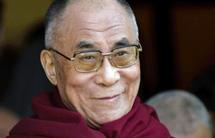
"I do not want to create any inconvenience to anybody," the Dalai Lama told CNN.
He said he accepted that Obama would not meet him "this time in order to avoid embarrassment to the Chinese president."
"So I have no disappointment," the Dalai Lama said.
The White House said Obama would meet with the exiled spiritual leader later this year but only after he pays his first presidential visit next month to China, with which the administration has been building warm relations.
Some US lawmakers and Tibet activists were furious over Obama's move, fearing that China will interpret it as carte blanche to clamp down on dissent in the largely Buddhist territory where it sent troops in 1950.
But the Dalai Lama said he was content with Obama's policy so far, noting the president has communicated with him through private channels.
"I think that is better in some cases," the Dalai Lama said.
"I think more serious discussion is better than just a picture" of the two meeting, he said.
Obama met with the Dalai Lama when he was a senator. Last month, he dispatched a high-level delegation, including his senior advisor Valerie Jarrett -- a close Chicago friend -- to the Tibetan leader's home-in-exile in Dharamshala, India to confirm his decision.
The Dalai Lama met in Washington with Maria Otero, the new US coordinator on Tibet policy, along with senior members of Congress, including House Speaker Nancy Pelosi and Senator John Kerry.
But his visit marked a strong contrast from his last trip to Washington in 2007, when then-president George W. Bush took the unprecedented step of appearing publicly with the Dalai Lama to award him the prestigious Congressional Gold Medal.
Two US congressmen called on Obama to press for concrete improvements in Tibet when he meets Chinese President Hu Jintao next month in Beijing.
Democrat Jim McGovern and Republican Frank Wolf, co-chairs of the congressional Tom Lantos Human Rights Commission, said they "would have preferred your conferring with the Dalai Lama prior to your trip to China."
"This approach has raised expectations that Tibet will be an issue of great importance on your summit agenda with President Hu," they wrote in a letter.
"We hope you will see the summit as a strategic opportunity to shift the ground under the Tibet issue, and create conditions that can lead to substantive progress," they said.
The congressmen said Obama should press in particular for improvements in the human rights situation in Tibet and work toward a "negotiated resolution that addresses the legitimate grievances of the Tibetan people."
The Dalai Lama frequently says he does not want to cause problems for foreign nations as he travels the globe addressing packed crowds on spiritual matters.
But China has been intensifying pressure on other nations' leaders not to see him. Last year it called off a major summit between China and European nations after French President Nicolas Sarkozy talked to the Dalai Lama.
------------------------------------------------------------------------------------------------------------------------------
He said he accepted that Obama would not meet him "this time in order to avoid embarrassment to the Chinese president."
"So I have no disappointment," the Dalai Lama said.
The White House said Obama would meet with the exiled spiritual leader later this year but only after he pays his first presidential visit next month to China, with which the administration has been building warm relations.
Some US lawmakers and Tibet activists were furious over Obama's move, fearing that China will interpret it as carte blanche to clamp down on dissent in the largely Buddhist territory where it sent troops in 1950.
But the Dalai Lama said he was content with Obama's policy so far, noting the president has communicated with him through private channels.
"I think that is better in some cases," the Dalai Lama said.
"I think more serious discussion is better than just a picture" of the two meeting, he said.
Obama met with the Dalai Lama when he was a senator. Last month, he dispatched a high-level delegation, including his senior advisor Valerie Jarrett -- a close Chicago friend -- to the Tibetan leader's home-in-exile in Dharamshala, India to confirm his decision.
The Dalai Lama met in Washington with Maria Otero, the new US coordinator on Tibet policy, along with senior members of Congress, including House Speaker Nancy Pelosi and Senator John Kerry.
But his visit marked a strong contrast from his last trip to Washington in 2007, when then-president George W. Bush took the unprecedented step of appearing publicly with the Dalai Lama to award him the prestigious Congressional Gold Medal.
Two US congressmen called on Obama to press for concrete improvements in Tibet when he meets Chinese President Hu Jintao next month in Beijing.
Democrat Jim McGovern and Republican Frank Wolf, co-chairs of the congressional Tom Lantos Human Rights Commission, said they "would have preferred your conferring with the Dalai Lama prior to your trip to China."
"This approach has raised expectations that Tibet will be an issue of great importance on your summit agenda with President Hu," they wrote in a letter.
"We hope you will see the summit as a strategic opportunity to shift the ground under the Tibet issue, and create conditions that can lead to substantive progress," they said.
The congressmen said Obama should press in particular for improvements in the human rights situation in Tibet and work toward a "negotiated resolution that addresses the legitimate grievances of the Tibetan people."
The Dalai Lama frequently says he does not want to cause problems for foreign nations as he travels the globe addressing packed crowds on spiritual matters.
But China has been intensifying pressure on other nations' leaders not to see him. Last year it called off a major summit between China and European nations after French President Nicolas Sarkozy talked to the Dalai Lama.
------------------------------------------------------------------------------------------------------------------------------









 Home
Home Politics
Politics









